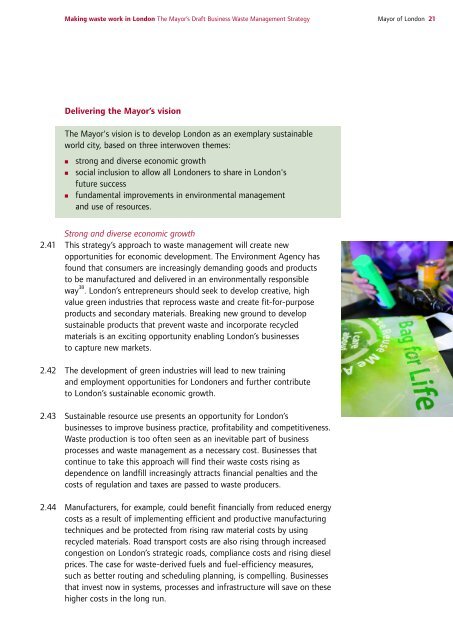Draft Business Waste Strategy PDF - london.gov.uk - Greater ...
Draft Business Waste Strategy PDF - london.gov.uk - Greater ...
Draft Business Waste Strategy PDF - london.gov.uk - Greater ...
You also want an ePaper? Increase the reach of your titles
YUMPU automatically turns print PDFs into web optimized ePapers that Google loves.
Making waste work in London The Mayor’s <strong>Draft</strong> <strong>Business</strong> <strong>Waste</strong> Management <strong>Strategy</strong> Mayor of London 21<br />
Delivering the Mayor’s vision<br />
The Mayor's vision is to develop London as an exemplary sustainable<br />
world city, based on three interwoven themes:<br />
■ strong and diverse economic growth<br />
■ social inclusion to allow all Londoners to share in London's<br />
future success<br />
■ fundamental improvements in environmental management<br />
and use of resources.<br />
Strong and diverse economic growth<br />
2.41 This strategy’s approach to waste management will create new<br />
opportunities for economic development. The Environment Agency has<br />
found that consumers are increasingly demanding goods and products<br />
to be manufactured and delivered in an environmentally responsible<br />
way 38 . London’s entrepreneurs should seek to develop creative, high<br />
value green industries that reprocess waste and create fit-for-purpose<br />
products and secondary materials. Breaking new ground to develop<br />
sustainable products that prevent waste and incorporate recycled<br />
materials is an exciting opportunity enabling London’s businesses<br />
to capture new markets.<br />
2.42 The development of green industries will lead to new training<br />
and employment opportunities for Londoners and further contribute<br />
to London’s sustainable economic growth.<br />
2.43 Sustainable resource use presents an opportunity for London’s<br />
businesses to improve business practice, profitability and competitiveness.<br />
<strong>Waste</strong> production is too often seen as an inevitable part of business<br />
processes and waste management as a necessary cost. <strong>Business</strong>es that<br />
continue to take this approach will find their waste costs rising as<br />
dependence on landfill increasingly attracts financial penalties and the<br />
costs of regulation and taxes are passed to waste producers.<br />
2.44 Manufacturers, for example, could benefit financially from reduced energy<br />
costs as a result of implementing efficient and productive manufacturing<br />
techniques and be protected from rising raw material costs by using<br />
recycled materials. Road transport costs are also rising through increased<br />
congestion on London’s strategic roads, compliance costs and rising diesel<br />
prices. The case for waste-derived fuels and fuel-efficiency measures,<br />
such as better routing and scheduling planning, is compelling. <strong>Business</strong>es<br />
that invest now in systems, processes and infrastructure will save on these<br />
higher costs in the long run.
















